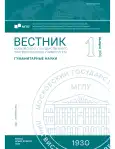English Word Stress in the Rhythmical Context of Australian and New Zealand Speech
- Authors: Shevchenko T.1, Borzykh A.1
-
Affiliations:
- Moscow State Linguistic University
- Issue: No 1(895) (2025)
- Pages: 112-118
- Section: Linguistics
- URL: https://bakhtiniada.ru/2542-2197/article/view/279197
- ID: 279197
Cite item
Full Text
Abstract
The paper reports on the new results of corpora analysis of stress in polysyllabic words based on the speech of Australian and New Zealand residents. The aim of the study is twofold: to explore specific features of rhythm in either country and to compare actual realizations of word stress patterns with dictionaries’ data. Australian English demonstrates features of syllable-based rhythm due to the speakers’ habit of prolonging unstressed syllables; New Zealand rhythm is faster and accent-based. In reading most of the patterns in both countries are British-oriented; the presence of secondary stresses which were found in reading by perceptual acoustic method is not consistently reflected in the Australian dictionary.
About the authors
Tatyana Shevchenko
Moscow State Linguistic University
Author for correspondence.
Email: tatashevchenko@mail.ru
Russian Federation
Anna Borzykh
Moscow State Linguistic University
Email: anna.a.borzykh@mail.ru
Russian Federation
References
- Fox, A. (2007). Prosodic Features and Prosodic Structure: The Phonology of Suprasegmentals. Oxford: Oxford University Press.
- Ladd, D. R. (1996). Intonational phonology. Cambridge: Cambridge University Press.
- Ladefoged, P. (2003). Phonetic Data Analysis. An Introduction to Fieldwork and Instrumental Techniques. Oxford: Blackwell Publishing.
- Torsuev, G. P. (1960). Voprosy aktsentologii sovremennogo angliyskogo yazyka = Issues of modern English accentology. Moscow; Leningrad: AN SSSR Press.
- Buraya, E. A. (2016). Australian English Words-Stress in a Multicultural Society. Vestnik of Moscow State Linguistic University, 1(740), 19–34. (In Russ.)
- Shevchenko, T. I., Buraya, E. A. (2020). Word Stress in Five National Varieties of English: Rhythm Trends. Moscow University Philology Bulletin, 4, 65–79.
- Borzykh, A. A. (2023). Comparative study of word stress in Australian and New Zealand English in the sociohistorical context of formation. Vestnik of Moscow State Linguistic University. Humanities, 1(869), 25–31.
- Shevchenko, T. I. (2017). Fonetika i fonologiya angliiskogo yazyka: Kurs teoreticheskoi fonetiki angliiskogo yazyka dlya bakalavrov = Phonetics and phonology of the English language: A course of theoretical phonetics of the English language for bachelor students. 2nd ed. Dubna: Fenix+. (In Russ.)
- Artyukhova, D. T. (2021). Retention of rhythmic structure in English polysyllabic words in Canadian discourse. Vestnik of Moscow State Linguistic University. Humanities, 1(843), 9–18.
- Shevchenko, T. I. (2016). Sotsiofonetika. Natsional’naya i sotsial’naya identichnost’ v angliyskom proiznoshenii = Sociophonetics. National and social identity in English pronunciation. 2nd ed. Moscow: Lenand. (In Russ.)
- Cutler, A., Carter, D. M. (1987). The predominance of strong initial syllables in the English vocabulary. Computer speech and language, 2, 133–142.
- Shevchenko, T. I., Romanova, E. Y. (2022). English word stress in norm-providing, norm-developing and normdependent countries. Vestnik of Moscow State Linguistic University. Humanities, 1(856), 142–149.
- Mairano, P., & Romano, A. (2010) Un confronto tra diverse metriche ritmiche usando Correlatore. In Schmid, S., Schwarzenbach, M., Studer, D. (Eds.), La dimensione temporale del parlato (pp. 79–100): Proc. of the V National AISV Congress, University of Zurich, Collegiengebaude, 2009, February 4–6. Torriana (RN): EDK.
- Shevchenko, T. I., Borzykh, A. A. (2024). Rhythm Variation of English in Australia and New Zealand. Teoreticheskaya i prikladnaya lingvistika = Theoretical and Applied Linguistics, 10(3), 212–224. (In Russ.)
- Bertinetto, P. M., Bertini, C. (2008). On modeling the rhythm of natural languages. In Barbosa, P. A., Madureira, S., Reis, C. (Eds.), Proc. of Speech Prosody 2008 (pp. 427–430), Campinas (Brazil), 2008, May 6–9. Urbana IL: Speech Prosody Special Interest Group (SproSIG).
Supplementary files










